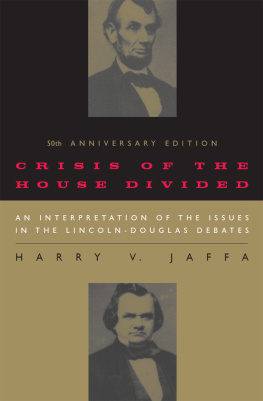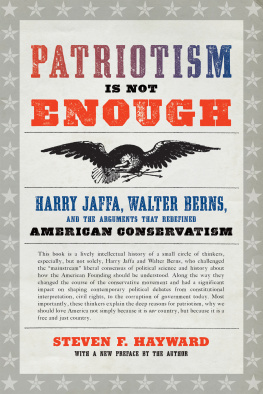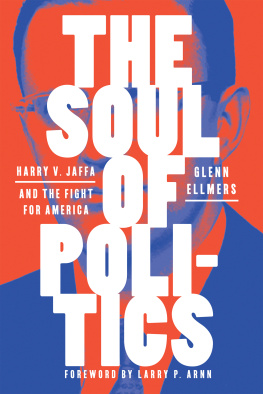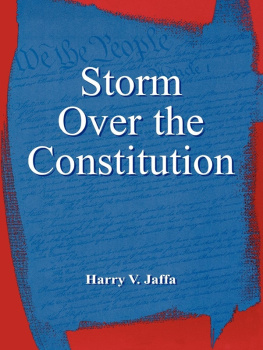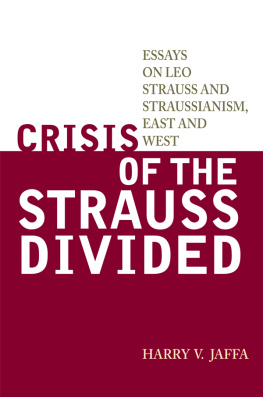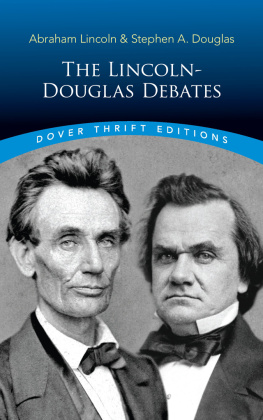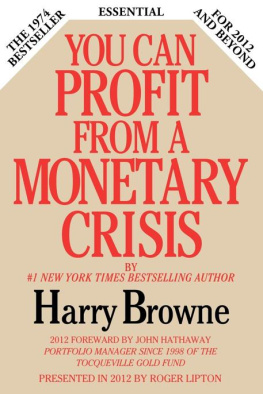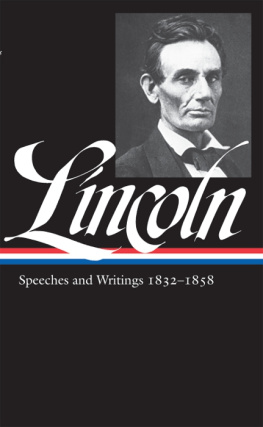Harry V. Jaffa - Crisis of the House Divided: An Interpretation of the Issues in the Lincoln-Douglas Debates
Here you can read online Harry V. Jaffa - Crisis of the House Divided: An Interpretation of the Issues in the Lincoln-Douglas Debates full text of the book (entire story) in english for free. Download pdf and epub, get meaning, cover and reviews about this ebook. year: 1959, publisher: The University of Chicago Press, genre: Science. Description of the work, (preface) as well as reviews are available. Best literature library LitArk.com created for fans of good reading and offers a wide selection of genres:
Romance novel
Science fiction
Adventure
Detective
Science
History
Home and family
Prose
Art
Politics
Computer
Non-fiction
Religion
Business
Children
Humor
Choose a favorite category and find really read worthwhile books. Enjoy immersion in the world of imagination, feel the emotions of the characters or learn something new for yourself, make an fascinating discovery.
- Book:Crisis of the House Divided: An Interpretation of the Issues in the Lincoln-Douglas Debates
- Author:
- Publisher:The University of Chicago Press
- Genre:
- Year:1959
- Rating:4 / 5
- Favourites:Add to favourites
- Your mark:
- 80
- 1
- 2
- 3
- 4
- 5
Crisis of the House Divided: An Interpretation of the Issues in the Lincoln-Douglas Debates: summary, description and annotation
We offer to read an annotation, description, summary or preface (depends on what the author of the book "Crisis of the House Divided: An Interpretation of the Issues in the Lincoln-Douglas Debates" wrote himself). If you haven't found the necessary information about the book — write in the comments, we will try to find it.
Harry V. Jaffa: author's other books
Who wrote Crisis of the House Divided: An Interpretation of the Issues in the Lincoln-Douglas Debates? Find out the surname, the name of the author of the book and a list of all author's works by series.
Crisis of the House Divided: An Interpretation of the Issues in the Lincoln-Douglas Debates — read online for free the complete book (whole text) full work
Below is the text of the book, divided by pages. System saving the place of the last page read, allows you to conveniently read the book "Crisis of the House Divided: An Interpretation of the Issues in the Lincoln-Douglas Debates" online for free, without having to search again every time where you left off. Put a bookmark, and you can go to the page where you finished reading at any time.
Font size:
Interval:
Bookmark:
The University of Chicago Press, Chicago 60637
The University of Chicago Press, Ltd., London
1959, 1982, 2009 by The University of Chicago
Introduction copyright 1973 by the University of Washington Press
All rights reserved. Published 2009
Printed in the United States of America
18 17 16 15 14 13 12 11 10 09 1 2 3 4 5
ISBN-13: 978-0-226-11158-2 (e-book)
ISBN-13: 978-0-226-39118-2 (paper)
ISBN-10: 0-226-39118-3 (paper)
Library of Congress Cataloging-in-Publication Data
Jaffa, Harry V.
Crisis of the house divided : an interpretation of the issues in the Lincoln-Douglas debates / Harry V Jaffa. 50th anniversary ed.
p. cm.
Includes bibliographical references and index.
ISBN-13: 978-0-226-39118-2 (pbk. : alk. paper)
ISBN-10: 0-226-39118-3 (pbk. : alk. paper)
ISBN 978-0-226-11158-2 (e-book)
1. Lincoln-Douglas Debates, Ill., 1858. 2. Lincoln, Abraham, 18091865Political career before 1861. 3. Douglas, Stephen Arnold, 18131861. 4. United StatesPolitics and government18571861. I. Title.
E457.4.J32 2009
973.6'8dc22
2008043971
 The paper used in this publication meets the minimum requirements of the American National Standard for Information SciencesPermanence of Paper for Printed Library Materials, ANSI Z39.481992.
The paper used in this publication meets the minimum requirements of the American National Standard for Information SciencesPermanence of Paper for Printed Library Materials, ANSI Z39.481992.
CRISIS OF THE HOUSE DIVIDED
An Interpretation of the Issues in the Lincoln-Douglas Debates
HARRY V. JAFFA
50th Anniversary Edition
The University of Chicago Press
Chicago and London
Introduction to the 50th Anniversary of Crisis of the House Divided
IT IS gratifying to an author of a book published fifty years ago that it is of sufficient interest today to warrant notice. It is of course more gratifying to the author that he can share in the celebration, having exceeded even the fourscore and seven years that divide the Gettysburg Address from the Declaration of Independence. But the proposition that unites the Gettysburg Address and the Declaration of Independencewhich is also the proposition that unites the Declaration of Independence and the ConstitutionThat all men are created equalremains the theme of my life and work, and of the books (especially A New Birth of Freedom) that have succeeded Crisis over the years.
Crisis was I believe the first bookindeed the first serious scholarly work of any kindon the Lincoln-Douglas debates. This notwithstanding the fact that, with the benefit of hindsight, we can see that the issues of the 1860 presidential election were in fact decided in the contest between Lincoln and Douglas that preceded it. The bulk of the vast Lincoln literature is either pro- or anti-Lincoln (or it is mere narrative that is neither pro nor anti) with little or no critical analysis. The pro-Lincoln literature for the most part accords him heroic stature for saving the Union, but it has little to say about the reasons that Lincoln believed made the Union worth saving. The pro-Southern anti-Lincoln literature usually prefers not to be identified now with the defense of slavery, but instead denounces Lincoln as an enemy of minority rights. The minority rights in question were the rights of the slave states to extend and perpetuate slavery, and the minority right upon which they focus is the right of secession. The rights of the slaves are not considered. The abolitionist anti-Lincoln literature denounces him as a white politician who became antislavery only for his own selfish political interests. However, not all who praised Lincoln for saving the Union approved his action against slavery. Nor did all who denounced him for denying the right of secession defend slavery. The inner logic to which Lincoln was committedconstitutionalism, the rule of law, and anti slaverywas not I think visible in the Lincoln literature before Crisis.
Lincolns reasoning was grounded, as was the Declaration of Independence itself, in a philosophic tradition that extended at least as far back as Aristotle. With the exception of Lord Charnwoods 1917 biography (by an Englishman), scarcely any of the Lincoln literature shows any awareness of this tradition or, if it does, takes it seriously. Lincoln hailed Jefferson for incorporating in the Declaration an abstract truth, applicable to all men and all times. I believe I am the first American Lincoln scholar to believeas Lincoln believedin the existence of such truth, and of the reasoning by which it is supported. A truth applicable to all men and all times must be grounded in a reality that is not itself time bound. The existence of a timeless realityNatures Godwhich is at the heart of Western civilization is also an assumption of Socratic philosophy. However it has never been an uncritical assumption. It is one that can and does withstand the most serious and competent skeptical analysis. For our time Leo Strausss Natural Right and History possesses within itself a Socratic refutation of historicism that is, I believe, definitive. Nevertheless, in our time historicism and its offspring nihilism have continued to dominate the blind mice of academic discourse.
In denying the possibility of moral and political principles that transcend time, historicism denies the possibility of rational judgments of men and events within historic time. It does so because it asserts that the standards of such judgments are as transient as the events that they judge. Of course, historicism never explains why the judgment that all judgments are subject to historical change is not itself subject to historical change. That is to say, if the principles of all moral and political judgments are as transient as the events they judge, why is the judgment that all such judgments are transient not itself transient? This self contradiction is at the heart of historicism. It is also at the heart of Leo Strausss refutation of historicism.
This refutation does not of itself establish a rational foundation for law and ethics. It is fashionable to say that it is a justification for pure nihilism, to abandonment of any attempt to find any foundation in reason for moral and political judgment. But it also points toward the direction of the classics, particularly Plato and Aristotle. According to Strauss, the classics were abandoned but were never refuted. Among so called Straussians there is a division as to whether he actually believed that modern philosophy had not refuted the classics, and whether Strausss assertion was real or merely exoteric. But there can be no doubt that Strauss regarded Lincolns statesmanship, as revealed in Crisis, although prudential in the last degree, as perfectly Aristotelian.
To repeat, Strausss refutation of historicism can lead to a blind nihilism, and for many, including many Straussians, it has done so. This has been their esoteric doctrine, and their exoteric commitment to American constitutionalism is a transparent veil to their inner detachment from the moral foundations of that constitutionalism. These foundations, according to Lincoln, and according to Crisis of the House Divided, are to be found and can be found in the Declaration of Independence.
The denial of the possibility of a rational judgment of men and eventsof political philosophy, properly so calledis ultimately a denial as well of the possibility of history. Consider the primacy in academic literature of Carl Beckers 1922 book, The Declaration of Independence, a book more fundamental for understanding the Lincoln literature of the last century than almost anything in the Lincoln literature. In it Becker asserts that To ask whether the natural rights philosophy of the Declaration of Independence is true or false is essentially a meaningless question. But the natural rights philosophy is nothing less than the form of the political philosophy that informed the understanding and practical judgmentthe statesmanshipof the Founders and of Lincoln. If it is essentially meaningless to ask whether that philosophy is true or false it is also meaningless to ask the questions to which that philosophy is addressed. It becomes meaningless to ask whether slavery was just or unjust, or whether the cause of the Union in the Civil War was just or unjust. (Or, we might add, to ask whether the cause represented by Churchill, or that represented by Hitler, was a just cause.)
Next pageFont size:
Interval:
Bookmark:
Similar books «Crisis of the House Divided: An Interpretation of the Issues in the Lincoln-Douglas Debates»
Look at similar books to Crisis of the House Divided: An Interpretation of the Issues in the Lincoln-Douglas Debates. We have selected literature similar in name and meaning in the hope of providing readers with more options to find new, interesting, not yet read works.
Discussion, reviews of the book Crisis of the House Divided: An Interpretation of the Issues in the Lincoln-Douglas Debates and just readers' own opinions. Leave your comments, write what you think about the work, its meaning or the main characters. Specify what exactly you liked and what you didn't like, and why you think so.

